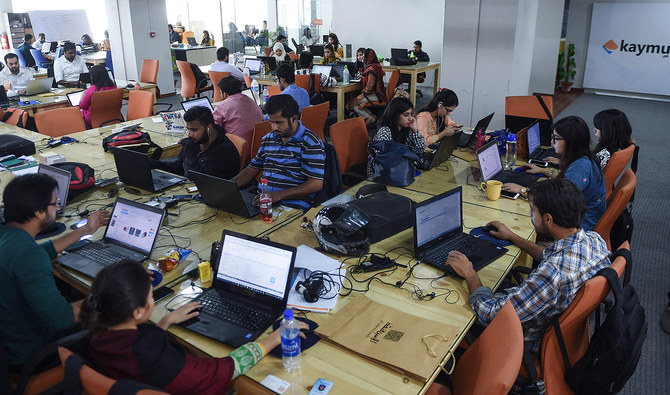ISLAMABAD: Pakistan's government is planning to boost the country’s monthly information and technology (IT) export remittances to over $1 billion from the current $220 million figure by offering incentives to professionals and freelancers, a consultant for the IT ministry confirmed on Sunday.
As many as 650,000 Pakistanis have been exporting their IT services to different countries around the globe, either through freelance work or different IT companies. This has helped these companies earn around $200-250 million per month in export remittances to the country.
Pakistan’s total IT export remittances were recorded at $2.6 billion last year. For the current fiscal year, the government has set a target of $4 billion.
Faced with a host of economic crises, Pakistan's foreign reserves have fallen to alarmingly low levels. The country's rupee has also faced massive depreciation over the past year as experts warn it could face a balance-of-payments crisis.
IT companies and freelancers in Pakistan have been urging the government to allow them to retain at least 35 percent of their proceeds in their foreign currency accounts and utilize them abroad if and when required for business development purposes.
In a bid to attract more inflows of remittances into the country, the government has agreed to the demand.
“A long-standing demand made by IT professionals and freelancers has been met, and now we hope this will help us boost the sector’s monthly remittances to over $1 billion,” Ali Kazim, a media consultant working for the Ministry of Information Technology, told Arab News on Sunday.
In absence of the facility to retain dollars in their accounts, freelancers, companies, and IT professionals had to open bank accounts in different countries including the UK, the U.S., and the UAE to receive payments.
“The majority of IT companies and freelancers were not getting their remittances in Pakistan, but now the trend would change with the provision of a 35 percent retention facility,” he said.
Kazim added the execution and implementation of this 35 percent retention facility for remittances would be fully operational in the next two to three months and that the State Bank of Pakistan has already issued directives to all public and private banks to implement the policy.
However, the Pakistan Software Houses Association for IT and ITES (P@SHA) doubted the facility would be fully implemented, saying that Pakistani banks were still creating hurdles in opening foreign currency bank accounts and issuing debit cards.
“The facility would remain useless unless banks allow internet banking and issue U.S. dollars enabled debit cards to freelancers and companies for instant outward remittances,” Mohammad Zohaib Khan, chairman P@SHA, told Arab News.
He said banks have so far refused to allow outward remittances through debit cards and internet banking citing the shortage of U.S. dollars in the country.
“If IT companies and freelancers are not provided the required facilities and incentives, the required growth in the industry would remain elusive,” he said.
Khan added that if trust in the Pakistani banking system was developed, this would take two to three years to boost IT exports to over $4 billion.




















